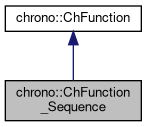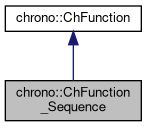Description
Sequence function: y = sequence_of_functions(f1(y), f2(y), f3(y)) All other function types can be inserted into this.
This function is very important because very complex motion laws can be created by sequencing many basic ChFunctions.
#include <ChFunction_Sequence.h>


Public Member Functions | |
| ChFunction_Sequence (const ChFunction_Sequence &other) | |
| virtual ChFunction_Sequence * | Clone () const override |
| "Virtual" copy constructor (covariant return type). | |
| virtual FunctionType | Get_Type () const override |
| Return the unique function type identifier. | |
| virtual double | Get_y (double x) const override |
| Return the y value of the function, at position x. | |
| virtual double | Get_y_dx (double x) const override |
| Return the dy/dx derivative of the function, at position x. More... | |
| virtual double | Get_y_dxdx (double x) const override |
| Return the ddy/dxdx double derivative of the function, at position x. More... | |
| void | Set_start (double m_start) |
| The sequence of functions starts at this x value. | |
| double | Get_start () const |
| std::list< ChFseqNode > & | Get_list () |
| Access the list of the sub-functions. | |
| void | Setup () |
| Scans all the seq.of functions and setup the timings and continuity offsets, to satisfy all constraints. More... | |
| bool | InsertFunct (std::shared_ptr< ChFunction > myfx, double duration, double weight=1, bool c0=false, bool c1=false, bool c2=false, int position=-1) |
| Insert function after the fx with defined "position" index in list. More... | |
| bool | KillFunct (int position) |
| Remove and deletes function with defined "position", and returns true. More... | |
| std::shared_ptr< ChFunction > | GetNthFunction (int position) |
| Returns the ChFunction with given "position". More... | |
| ChFseqNode * | GetNthNode (int position) |
| As above, but returns the function node (containing function pointer, function duration, continuity flags with previous node, etc.) | |
| double | GetNthDuration (int position) |
| As above, but returning duration. More... | |
| virtual double | Get_weight (double x) const override |
| Return the weight of the function (useful for applications where you need to mix different weighted ChFunctions) | |
| virtual void | Estimate_x_range (double &xmin, double &xmax) const override |
| Return an estimate of the range of the function argument. More... | |
| virtual int | HandleNumber () const override |
| Return the number of handles of the function. | |
| virtual bool | HandleAccess (int handle_id, double mx, double my, bool set_mode) override |
| Get the x and y position of handle, given identifier. More... | |
| virtual void | ArchiveOUT (ChArchiveOut &marchive) override |
| Method to allow serialization of transient data to archives. | |
| virtual void | ArchiveIN (ChArchiveIn &marchive) override |
| Method to allow de-serialization of transient data from archives. | |
 Public Member Functions inherited from chrono::ChFunction Public Member Functions inherited from chrono::ChFunction | |
| ChFunction (const ChFunction &other) | |
| virtual void | Estimate_y_range (double xmin, double xmax, double &ymin, double &ymax, int derivate) const |
| Return an estimate of the range of the function value. More... | |
| virtual double | Get_y_dN (double x, int derivate) const |
| Return the function derivative of specified order at the given point. More... | |
| virtual void | Update (const double x) |
| Update could be implemented by children classes, ex. to launch callbacks. | |
| virtual double | Compute_max (double xmin, double xmax, double sampling_step, int derivate) const |
| Compute the maximum of y(x) in a range xmin-xmax, using a sampling method. | |
| virtual double | Compute_min (double xmin, double xmax, double sampling_step, int derivate) const |
| Compute the minimum of y(x) in a range xmin-xmax, using a sampling method. | |
| virtual double | Compute_mean (double xmin, double xmax, double sampling_step, int derivate) const |
| Compute the mean value of y(x) in a range xmin-xmax, using a sampling method. | |
| virtual double | Compute_sqrmean (double xmin, double xmax, double sampling_step, int derivate) const |
| Compute the square mean val. of y(x) in a range xmin-xmax, using sampling. | |
| virtual double | Compute_int (double xmin, double xmax, double sampling_step, int derivate) const |
| Compute the integral of y(x) in a range xmin-xmax, using a sampling method. | |
| virtual double | Get_Ca_pos () const |
| Computes the positive acceleration coefficient (inherited classes should customize this). | |
| virtual double | Get_Ca_neg () const |
| Compute the positive acceleration coefficient (inherited classes should customize this). | |
| virtual double | Get_Cv () const |
| Compute the speed coefficient (inherited classes must customize this). | |
| virtual int | FilePostscriptPlot (ChFile_ps *m_file, int plotY, int plotDY, int plotDDY) |
| Plot function in graph space of the ChFile_ps postscript file where zoom factor, centering, color, thickness etc. More... | |
| virtual int | FileAsciiPairsSave (ChStreamOutAscii &m_file, double xmin=0, double xmax=1, int msamples=200) |
| Save function as X-Y pairs separated by space, with CR at each pair, into an ASCII file. More... | |
Additional Inherited Members | |
 Public Types inherited from chrono::ChFunction Public Types inherited from chrono::ChFunction | |
| enum | FunctionType { FUNCT_CUSTOM, FUNCT_CONST, FUNCT_CONSTACC, FUNCT_DERIVE, FUNCT_FILLET3, FUNCT_INTEGRATE, FUNCT_MATLAB, FUNCT_MIRROR, FUNCT_MOCAP, FUNCT_NOISE, FUNCT_OPERATION, FUNCT_OSCILLOSCOPE, FUNCT_POLY, FUNCT_POLY345, FUNCT_RAMP, FUNCT_RECORDER, FUNCT_REPEAT, FUNCT_SEQUENCE, FUNCT_SIGMA, FUNCT_SINE, FUNCT_LAMBDA } |
| Enumeration of function types. | |
Member Function Documentation
◆ Estimate_x_range()
|
overridevirtual |
Return an estimate of the range of the function argument.
(Can be used for automatic zooming in a GUI)
Reimplemented from chrono::ChFunction.
◆ Get_y_dx()
|
overridevirtual |
Return the dy/dx derivative of the function, at position x.
Note that inherited classes may also avoid overriding this method, because this base method already provide a general-purpose numerical differentiation to get dy/dx only from the Get_y() function. (however, if the analytical derivative is known, it may better to implement a custom method).
Reimplemented from chrono::ChFunction.
◆ Get_y_dxdx()
|
overridevirtual |
Return the ddy/dxdx double derivative of the function, at position x.
Note that inherited classes may also avoid overriding this method, because this base method already provide a general-purpose numerical differentiation to get ddy/dxdx only from the Get_y() function. (however, if the analytical derivative is known, it may be better to implement a custom method).
Reimplemented from chrono::ChFunction.
◆ GetNthDuration()
| double chrono::ChFunction_Sequence::GetNthDuration | ( | int | position | ) |
As above, but returning duration.
(return value is reference, so it can be also changed later, but remember Setup() for the ChFunction_Sequence after you modified this return value by reference TO DO). If no function, returns 0.
◆ GetNthFunction()
| std::shared_ptr< ChFunction > chrono::ChFunction_Sequence::GetNthFunction | ( | int | position | ) |
Returns the ChFunction with given "position".
- If position = 0, returns always head (beginning),
- If position = -1 returns tail (end).
- If position > max number of current nodes, returns tail fx anyway.
◆ HandleAccess()
|
overridevirtual |
Get the x and y position of handle, given identifier.
If set mode, x and y values are stored. Return false if handle not found.
Reimplemented from chrono::ChFunction.
◆ InsertFunct()
| bool chrono::ChFunction_Sequence::InsertFunct | ( | std::shared_ptr< ChFunction > | myfx, |
| double | duration, | ||
| double | weight = 1, |
||
| bool | c0 = false, |
||
| bool | c1 = false, |
||
| bool | c2 = false, |
||
| int | position = -1 |
||
| ) |
Insert function after the fx with defined "position" index in list.
- If index is higher than available objects, it simply goes to the end.
- If index = 0 insert at the beginning,
- If index = -1 insert at the end. Inserted functions will be deleted automatically when this object will be deleted. The fx segment has its own 'weight': use 1.0 for default, or different weights if you want that Get_weight() will give different results depending on the "x" parameter. Set c0=true if you want to force C0 continuity with previous function (an offset will be implicitly added to the function, as y=f(x)+Offset). Same for C1 and C2 continuity, using c1 and c2 flags.
- Parameters
-
myfx the function to insert duration duration of the time segment for this function weight optional weight scalar c0 impose continuity to previous f() by offsetting/slanting c1 impose continuity to previous f() by offsetting/slanting c2 impose continuity to previous f() by offsetting/slanting position position index, 0,1,2,3.. (if -1 insert at the end)
◆ KillFunct()
| bool chrono::ChFunction_Sequence::KillFunct | ( | int | position | ) |
Remove and deletes function with defined "position", and returns true.
- If position = 0, removes always head (beginning),
- If position = -1 removes tail (end).
- If position > max number of current nodes, removes tail anyway, but returns false.
◆ Setup()
| void chrono::ChFunction_Sequence::Setup | ( | ) |
Scans all the seq.of functions and setup the timings and continuity offsets, to satisfy all constraints.
This must be called whenever a new function is inserted, or its timing and continuity constraints are changed.
The documentation for this class was generated from the following files:
- /builds/uwsbel/chrono/src/chrono/motion_functions/ChFunction_Sequence.h
- /builds/uwsbel/chrono/src/chrono/motion_functions/ChFunction_Sequence.cpp
